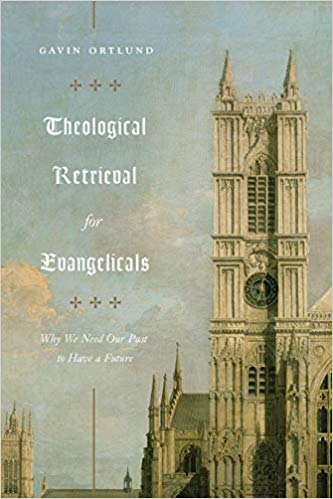A Book Review from Books At a Glance
By Michael A. G. Haykin
From small beginnings with Roman Catholic scholars like Jean Daniélou and Henri de Lubac in their determination to engage in ressourcement in the 1930s, theological retrieval has become a significant force not only within Roman Catholic scholarship, but also within mainstream Protestantism and, in more recent years as Gavin Ortlund points out in this new work, Western Evangelicalism. This is all to the good, for major areas of Evangelicalism have long suffered, in their piety, worship, and theological reflection, from a significant degree of shallowness that immersion in the rich waters of the past can rectify to some degree. Ortlund compares theological retrieval to “spending significant time in a foreign country” (p.12). As he argues, exposure to other eras of theological and spiritual formation “is an enriching, formative experience, comparable to travelling to a foreign country and being immersed in the culture and geography” (p.71). Ortlund sees this retrieval as timely, for currently, he rightly points out, there is “a deep thirst for historical rootedness” among younger Evangelicals, an “Evangelical ache for history” (p.52, 46). In fact, when Evangelicals ignore the past, they are actually reflecting a deep degree of worldliness for “our culture tends toward an isolation from the past” (p.65). And Evangelical shallowness can be interpreted as yet another example of “the barrenness that characterizes so much of the intellectual world of late modernity” (p.81).
A key question, though, is which periods of church history are best equipped to provide this enrichment? To those who know something of “the sheer immensity of church history” (p.81), answering this question is not an easy one. Most Evangelicals, Ortlund implies, take the easy way out when they suggest western church history during the time of the Reformation and subsequent streams flowing out from that massive sea-change. Ortlund, though, challenges his readers to consider the Ancient Church and medieval Christianity, and thus explore such neglected figures as Boethius, Gregory the Great, and John of Damascus (p.76–81). The second half of his book provides his reader with four specific examples of how such retrieval can be done and how it can benefit theological reflection: utilizing the thought of Boethius, Calvin, and T. F. Torrance with regard to the difference between Creator and creature (chapter 4); thinking about the attribute of divine simplicity with patristic and medieval authors (chapter 5); seeing how the thinking of Irenaeus, Athanasius, and Anselm about the cross-work of Christ can dovetail (chapter 6); and finally, distilling pastoral wisdom from Gregory the Great’s The Book of Pastoral Rule, what Gregory, along with earlier patristic authors, called the “art of arts” (chapter 7). Not all Evangelicals will agree with all of the details of these four examples of theological retrieval, but Ortlund clearly shows that the thousand years between Augustine and Martin Luther is not some “black hole” when the Holy Spirit ceased to do his new-covenant ministry (see p.48–49).
Ortlund is well aware that theological “retrieval can go wrong” (p.73). It can become something similar to proof-texting, what Ortlund calls “a piecemeal ransacking and deploying of whatever quotes or concepts from church history we happen to find useful” (p.73). The past, like the Scriptures, must be interpreted in light of its context. Drawing artificial parallels between the past and the present is another danger (p.73–74). Yet a “third danger is repristination,” where an era or aspect of the past is transformed into a static ideal. Here, Ortlund reminds the reader that true retrieval always takes into consideration “the holy strangeness of the past” (p.74—this phrase is from David Buschart and Kent Eilers). There will always be aspects of the past that cannot be retrieved for the basic fact that we disagree with them. Witness, for example, some of the thought of Augustine that does not fit into the standard Evangelical paradigm (see p.28–30).
As an appeal for Evangelicals to engage their “catholic heritage” in the patristic and medieval eras, Ortlund’s monograph succeeds admirably. Readers may rightly quibble with this detail or that, but the need for and value of theological retrieval of the past could not be made clearer. In the words of the nineteenth-century historian Philip Schaff: “History is, and must ever continue to be, next to God’s word, the richest fountain of wisdom” (cited p.45).
Michael A.G. Haykin
The Southern Baptist Theological Seminary
